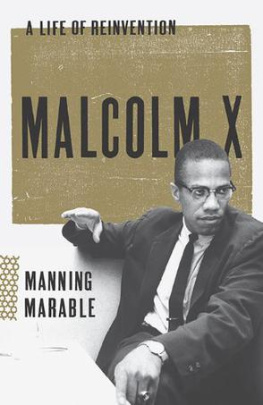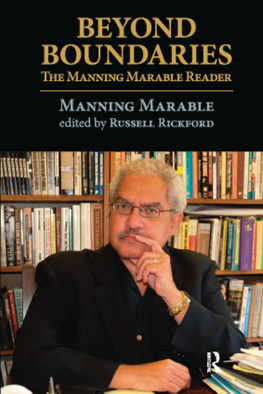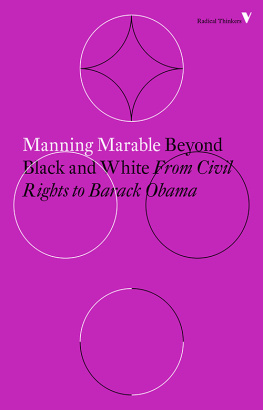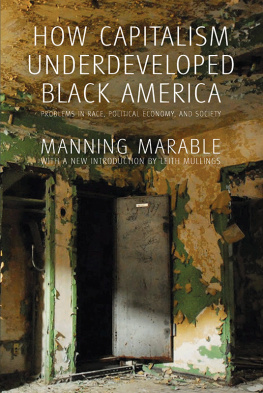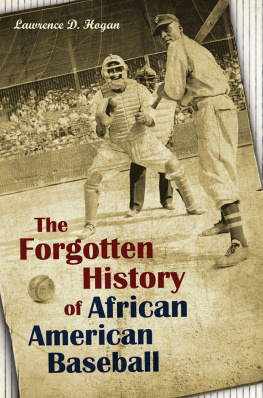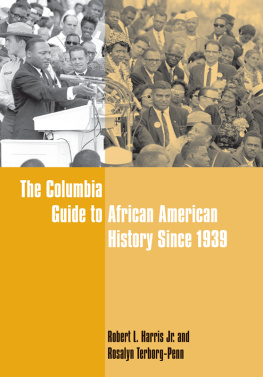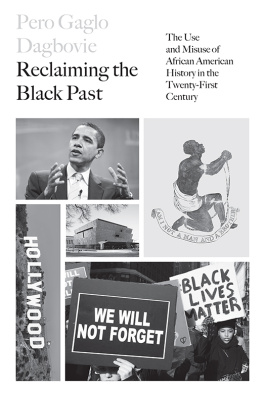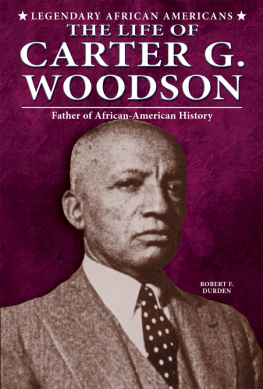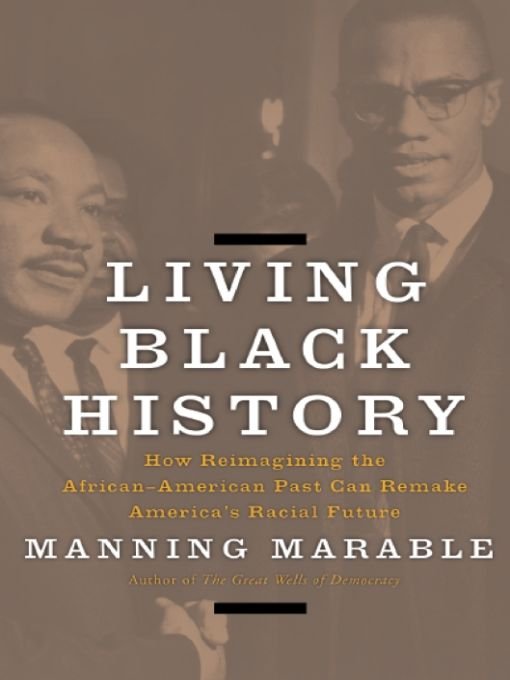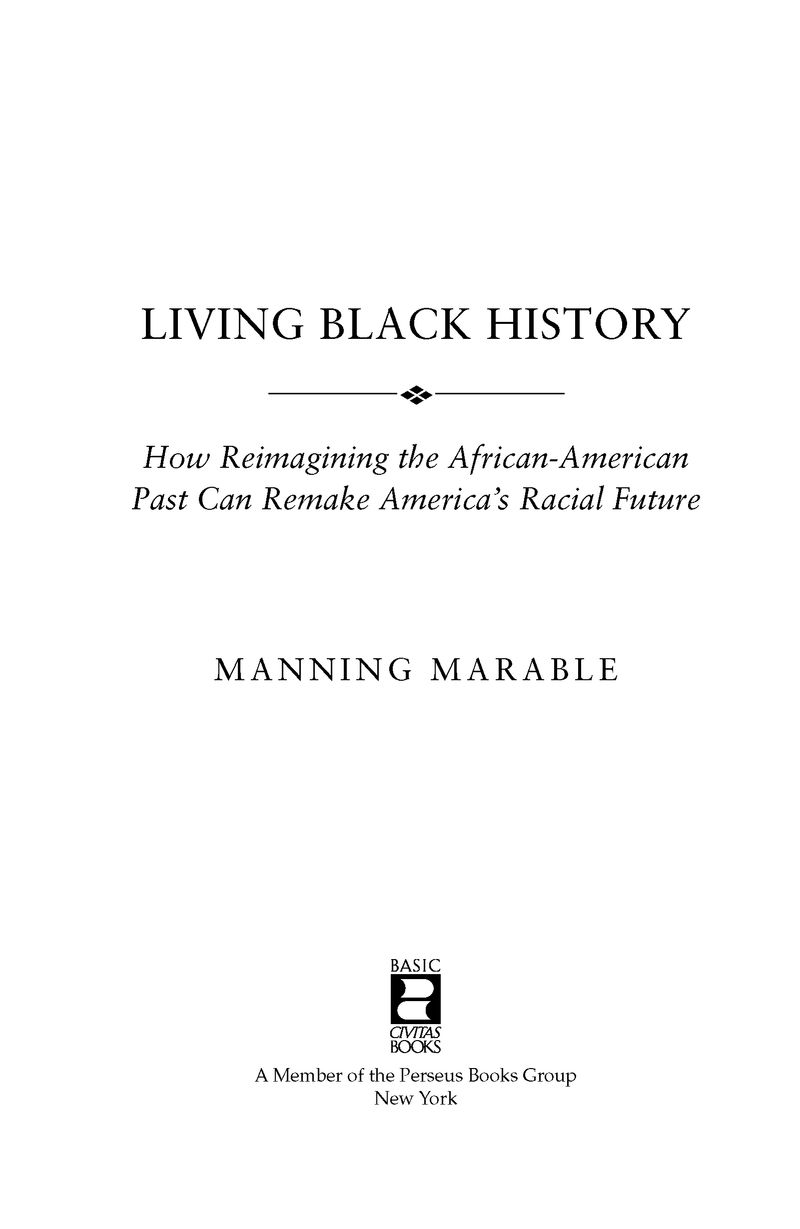Table of Contents
Also by MANNING MARABLE
African and Caribbean Politics:
From Kwame Nkrumah to the Grenada Revolution
The Autobiography of Medgar Evers:
A Heros Life and Legacy Revealed
Through His Writings, Letters, and Speeches
(coeditor with Myrlie Evers-Williams)
Beyond Black and White:
Transforming African American Politics
Black American Politics:
From the Washington Marches to Jesse Jackson
Black Leadership:
Four Great American Leaders and the
Struggle for Civil Rights
Black Liberation in Conservative America:
Essays on Race, Politics, and Society
Blackwater:
Historical Studies in Race,
Class Consciousness, and Revolution
The Crisis of Color and Democracy:
Essays on Race, Class, and Power
Dispatches from the Ivory Tower:
Intellectuals Confront the African American Experience
(editor)
Freedom:
A Photographic History of the
African American Freedom Struggle
(coauthor with Leith Mullings)
Freedom on My Mind:
The Columbia Documentary History of the
African American Experience
(editor)
From the Grassroots:
Essays Toward Afro-American Liberation
The Great Wells of Democracy:
The Meaning of Race in American Life
How Capitalism Underdeveloped Black America: Problems in Race, Political Economy, and Society
Let Nobody Turn Us Around:
Voices of Resistance, Reform, and Renewal
(coeditor with Leith Mullings)
The New Black Renaissance:
The Souls Anthology of Critical African-American Studies
(editor)
Race, Reform, and Rebellion:
The Second Reconstruction in Black America, 19451990
Speaking Truth to Power:
Essays on Race, Radicalism, and Resistance
W. E. B. Du Bois: Black Radical Democrat
The 2004 W. E. B. Du Bois Lectures at Harvard University, and the added essays here, were inspired by three great icons of the black freedom struggle:
Ossie Davis
Myrlie Evers-Williams
Robert L. Carter
Their courageous legacies endurepast, present, and future.
Preface and Acknowledgments
... God of our weary years,
God of our silent tears,
Thou who has brought us thus far on the way;
Thou who has by Thy might,
Led us into the light,
Keep us forever in the path, we pray.
Lest our feet stray from the places,
Our God, where we met Thee;
Lest, our hearts drunk with
The wine of the world, we forget Thee;
Shadowed beneath thy hand, may we forever stand.
True to our God, true to our native land.
LIFT EVRY VOICE AND SING, 1900.
(LYRICS BY JAMES WELDON JOHNSON;
MUSIC BY J. ROSAMOND JOHNSON)
LIVING BLACK HISTORY WAS INSPIRED BY TWO EVENTS, involving two icons of twentieth-century black history. In March 2003, Myrlie Evers-Williams, the former National Chairman of the NAACP and the widow of martyred civil rights leader Medgar Evers, contacted me to deliver the first honorary Medgar Evers Lecture in Jackson, Mississippi. It was the fortieth anniversary of Everss brutal assassination in front of his Jackson home, and the occasion would be marked by a series of public events including a long-overdue recognition by both the governor and the state legislature of Mississippi.
As I began researching in preparation for the lecture, I was struck by the absence of any detailed literature on this pivotal figure in African-American history. While no scholarly biography existed of Medgar Evers there were several detailed studies of his assassin, Byron de la Beckwith. Even in the 1996 Hollywood film Ghosts of Mississippi, which depicts Everss assassination and Myrlies thirty-year crusade to bring her late husbands killer to justice, Evers himself is only present as a ghost. Viewers are given absolutely no historical background as to Everss courageous battle to destroy the particularly brutal brand of Jim Crow racism that flourished in Mississippi for so long. I soon became convinced of the urgency in preserving Everss legacy: His speeches, writings, and other important documents pertaining to his life and politics/activism had to be published and available for future generations.
I traveled again to Mississippi in 2004 and began a close friendship with Myrlie. When Myrlie invited me to visit her former home, I thought I was prepared for what would surely be an emotional experience. Yet no amount of historical study or documentary knowledge could have truly prepared me for the tangible power of past tragedy held in that physical place. Myrlie and I stood in the driveway of their home, where the assassins bullet had struck Medgar in the back. Kneeling, she softly explained that for months following Medgars murder she would go outside in the dark of the night and vigorously attempt to scrub the bloodstains off the driveway. No matter how hard she scrubbed, no matter how many sleepless nights she spent trying, Medgars bloodstains would not come clean. Her plaintive words were almost apologetic: She had been unable to wipe clean a stain that had left her without a loving husband and her children without a father. I was so overwhelmed I could barely keep from weeping aloud.
Walking into her modest home, Myrlie explained how the bullet that had killed Medgar ripped through his upper body, then crashed through the living room front window, through a wall, and into the small kitchen. It ricocheted off the refrigeratorthe bullets scar is still visibleand came to rest on the kitchen countertop next to a watermelon. We then walked to the master bedroom. Medgar usually slept on the right side of their bed, next to the windows. He always kept a loaded gun next to his nightstand. Myrlie slept on the left, and kept her own gun nearby as well. Facing almost constant threats for nearly a decadewhile investigating the murders and lynchings of Mississippi blacks such as Emmett Tillthey were dedicated to the struggle for black freedom. They lived their lives with the knowledge that death was ultimately inevitable, if not imminent. Myrlie told me that the day before Medgars murder she had spent the afternoon starching and ironing about a dozen of her husbands white dress shirts. Medgar happened to come home early that day, and he saw Myrlie busily ironing his shirts. Arent you going to thank me for taking care of your shirts? she asked her husband. Medgars voice lowered. Im not going to be needing them.
What we, as Americans, owe Medgar and Myrlie Evers can scarcely be put into words. To sacrifice everythingpersonal safety, income, and life itselffor the cause of democracy and equal justice is monumental. Yet days following Medgars death, the grief-stricken office staff at the Jackson NAACP headquarters unthinkingly packed up roughly twenty drawers of files documenting his tireless labors as the states first field secretary. Medgars files were then dumped into the garbage, disappearing for all time from recorded history. About four boxes of personal items, papers, and memorabilia were retained and dropped off at the familys residence. A well-meaning neighbor, thinking that the boxes in the familys carport were trash, took them to the front curb to be picked up by the sanitation truck. One of those boxes was taken by garbage collectors; fortunately for black history, the others were not.


